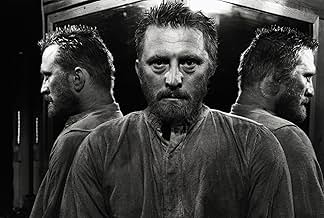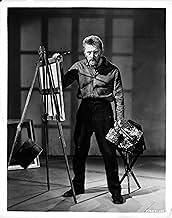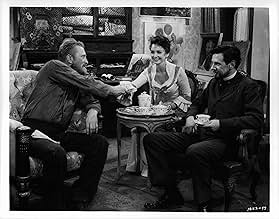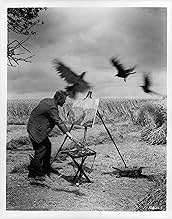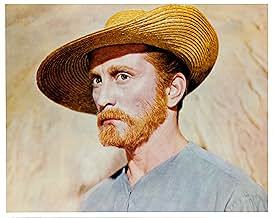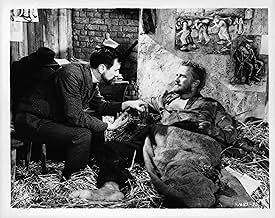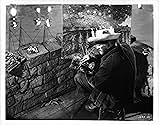AVALIAÇÃO DA IMDb
7,3/10
13 mil
SUA AVALIAÇÃO
A vida do brilhante, mas torturado artista Vincent van Gogh.A vida do brilhante, mas torturado artista Vincent van Gogh.A vida do brilhante, mas torturado artista Vincent van Gogh.
- Ganhou 1 Oscar
- 4 vitórias e 6 indicações no total
- Direção
- Roteiristas
- Elenco e equipe completos
- Produção, bilheteria e muito mais no IMDbPro
Enredo
Você sabia?
- CuriosidadesIn his memoir "The Ragman's Son" Kirk Douglas recounted that John Wayne attended a screening of the film, and was horrified. "Christ, Kirk! How can you play a part like that? There's so few of us left. We got to play strong, tough characters. Not those weak queers," Wayne said. Douglas tried to explain, "It's all make-believe, John. It isn't real. You're not really John Wayne, you know." Wayne (born Marion Morrison) looked at him oddly, as if Douglas had betrayed him.
- Erros de gravaçãoAt Arles, when Paul Gauguin is explaining his philosophy, Vincent mistakes him for Theo saying "but Theo, err Paul..." However, this is in the script. The whole point of the line is that Van Gogh views his conversation with Gauguin as nothing more than an extension of talks he's had with Theo since childhood.
- Citações
Paul Gauguin: I'm talking about women, man. Women. I like 'em fat and vicious and not too smart. Nothing spiritual either. To have to say 'I love you' would break my teeth. I don't want to be loved.
Vincent Van Gogh: You really mean that, Paul.
- ConexõesFeatured in Van Gogh: Darkness Into Light (1956)
- Trilhas sonorasLa Marseillaise
(1792) (uncredited)
Written by Claude Joseph Rouget de Lisle
Played by a band in France, near the end
Avaliação em destaque
Kirk Douglas is Vincent Van Gogh in "Lust for Life," directed by Vincent Minnelli and also starring Anthony Quinn as Gaugin (Oscar winner for his performance), and James Donal as Van Gogh's brother Theo.
This film is actually based on the Irving Stone novel and while it leaves out parts of Van Gogh's life, it does seem to hit the high points. A sensitive man with a spiritual sense of life, Van Gogh seeks from the beginning to express God in some way and to give something to the world. He is unsuccessful as a minister and eventually takes up painting, supported by his loving brother Theo. Basically he lives somewhere until whomever he's living with gets sick of him and throws him out. He is a terribly lonely man, but he has an intensity that is almost frightening to people. At one point, he takes up with a sometime prostitute with a baby - she eventually leaves. In actual fact, when Van Gogh met this woman, named Sien, she was pregnant with a second child, who grew up believing Van Gogh was his father. Sien some 20+ years later commits suicide.
Van Gogh establishes a friendship with Gaugin and has dreams of an artist colony, but his relationship with Gaugin, as with everyone but his brother, ends terribly when he stalks Gaugin with an open straight razor, later cutting off part of his own ear. It is evident from the film that whatever Van Gogh's mental problem was (and there are many theories, from bipolar, to epilepsy, to schizophrenia), it worsened as time went on, as did his physical condition. He would often buy paints rather than eat and would work ceaselessly.
Van Gogh only sold one painting in his lifetime - however, what the film does not show is that, had he chosen to live, he was on the brink of being recognized for his work. His paintings had started being exhibited and appreciated and began to sell shortly after his death. What also isn't in the film is that his brother died shortly after Van Gogh did. It was Theo's widow who carried on the work that would be involved with Van Gogh's vast collection.
The film reduced me to tears - indeed, the song that says "they should have told you, Vincent, the world was never meant for one as beautiful as you" was certainly true. The only person who ever "got" Vincent was his brother.
As for the performances, Kirk Douglas makes a brilliant Van Gogh. Michael Douglas once said his father isn't considered a great actor because the style back then in the types of roles he played has changed. It's true - seen today, Douglas' work seems too intense at times, too big, too over the top in these times of acting so naturally as to almost be boring. However, I believe that Van Gogh must have been like the Douglas characterization. He obviously drove people away in large masses, and Douglas captured that passion, drive, and overeagerness perfectly. As Theo, James Donal is perfect as the calm one in the family. Anthony Quinn has a short but memorable role as the flamboyant Gaugin. He's wonderful - arrogant, opinionated, temperamental, with a bad temper, and Quinn plays him as an artist without the soul of Van Gogh. But who, after all, had the soul of Van Gogh? Vincent Minnelli lovingly directed this film and it definitely has his wonderful attention to detail, flow, and artistic touch. And the paintings are breathtaking. A beautiful film that will stay with you for a long time, and you'll never see "Starry Night" in the same way again.
This film is actually based on the Irving Stone novel and while it leaves out parts of Van Gogh's life, it does seem to hit the high points. A sensitive man with a spiritual sense of life, Van Gogh seeks from the beginning to express God in some way and to give something to the world. He is unsuccessful as a minister and eventually takes up painting, supported by his loving brother Theo. Basically he lives somewhere until whomever he's living with gets sick of him and throws him out. He is a terribly lonely man, but he has an intensity that is almost frightening to people. At one point, he takes up with a sometime prostitute with a baby - she eventually leaves. In actual fact, when Van Gogh met this woman, named Sien, she was pregnant with a second child, who grew up believing Van Gogh was his father. Sien some 20+ years later commits suicide.
Van Gogh establishes a friendship with Gaugin and has dreams of an artist colony, but his relationship with Gaugin, as with everyone but his brother, ends terribly when he stalks Gaugin with an open straight razor, later cutting off part of his own ear. It is evident from the film that whatever Van Gogh's mental problem was (and there are many theories, from bipolar, to epilepsy, to schizophrenia), it worsened as time went on, as did his physical condition. He would often buy paints rather than eat and would work ceaselessly.
Van Gogh only sold one painting in his lifetime - however, what the film does not show is that, had he chosen to live, he was on the brink of being recognized for his work. His paintings had started being exhibited and appreciated and began to sell shortly after his death. What also isn't in the film is that his brother died shortly after Van Gogh did. It was Theo's widow who carried on the work that would be involved with Van Gogh's vast collection.
The film reduced me to tears - indeed, the song that says "they should have told you, Vincent, the world was never meant for one as beautiful as you" was certainly true. The only person who ever "got" Vincent was his brother.
As for the performances, Kirk Douglas makes a brilliant Van Gogh. Michael Douglas once said his father isn't considered a great actor because the style back then in the types of roles he played has changed. It's true - seen today, Douglas' work seems too intense at times, too big, too over the top in these times of acting so naturally as to almost be boring. However, I believe that Van Gogh must have been like the Douglas characterization. He obviously drove people away in large masses, and Douglas captured that passion, drive, and overeagerness perfectly. As Theo, James Donal is perfect as the calm one in the family. Anthony Quinn has a short but memorable role as the flamboyant Gaugin. He's wonderful - arrogant, opinionated, temperamental, with a bad temper, and Quinn plays him as an artist without the soul of Van Gogh. But who, after all, had the soul of Van Gogh? Vincent Minnelli lovingly directed this film and it definitely has his wonderful attention to detail, flow, and artistic touch. And the paintings are breathtaking. A beautiful film that will stay with you for a long time, and you'll never see "Starry Night" in the same way again.
- blanche-2
- 30 de dez. de 2006
- Link permanente
Principais escolhas
Faça login para avaliar e ver a lista de recomendações personalizadas
Detalhes
Bilheteria
- Orçamento
- US$ 3.227.000 (estimativa)
- Tempo de duração2 horas 2 minutos
- Cor
- Proporção
- 2.55 : 1
Contribua para esta página
Sugerir uma alteração ou adicionar conteúdo ausente


![Assistir a Trailer [OV]](https://m.media-amazon.com/images/M/MV5BNjMwYjdhMDItMDA1NC00YjJlLWFhZjctYWY5YjBlNDdiODFiXkEyXkFqcGdeQXRyYW5zY29kZS13b3JrZmxvdw@@._V1_QL75_UX500_CR0)
